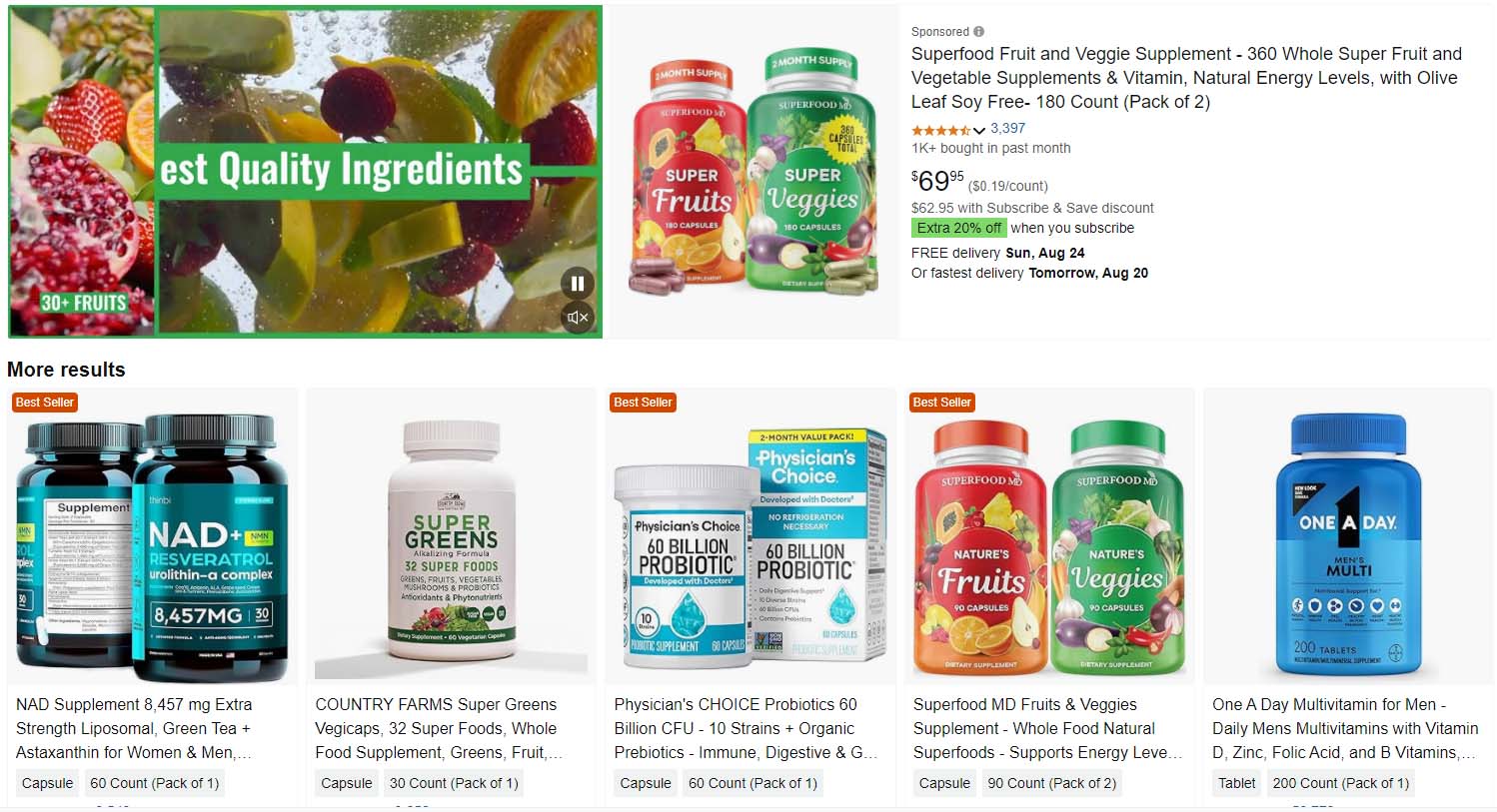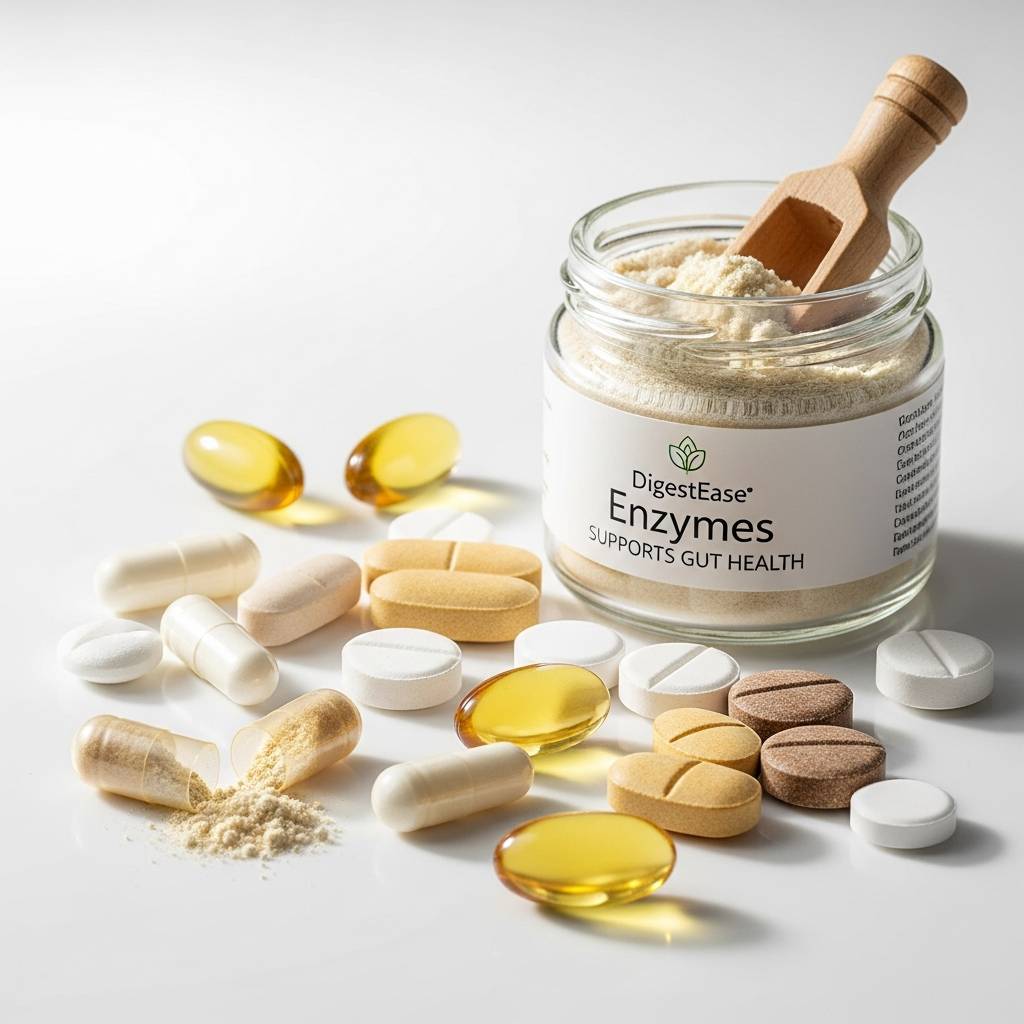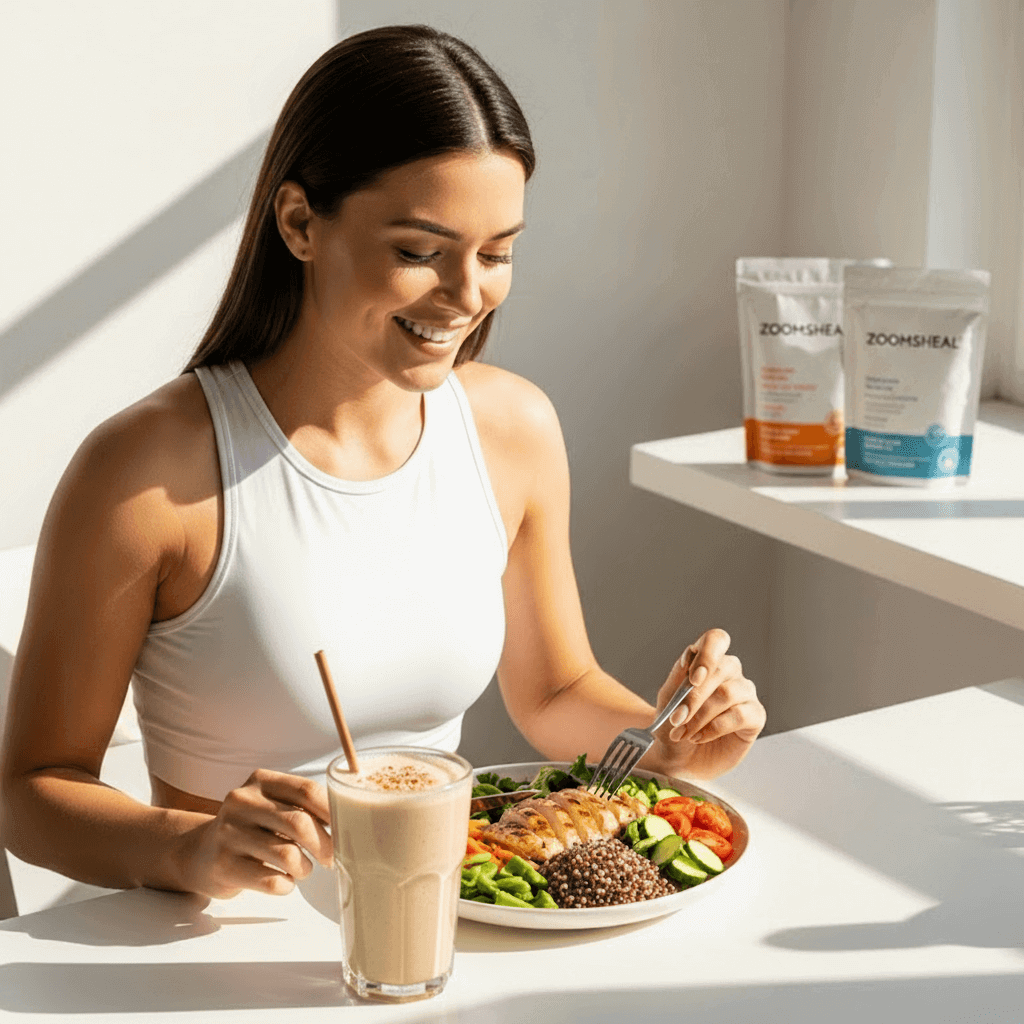Finding the ideal dietary supplements on Amazon isn't always easy, distinguishing between high-quality, effective supplements and questionable ones is a significant challenge. However, by focusing on key criteria and understanding what to look for, you can make informed decisions to select products that genuinely support your health goals.

This comprehensive guide aims to equip you with the strategies to confidently choose suitable dietary supplements on Amazon, ensuring you prioritize safety, quality, and efficacy in your health pursuits.
The Amazon Supplement Ecosystem: Opportunities and Unique Challenges
Amazon's immense marketplace offers unparalleled convenience and a vast selection of dietary supplements, often at competitive prices. You can find everything from common vitamins and minerals to specialized herbal extracts and complex formulations. Yet, this accessibility also presents a unique set of challenges that savvy shoppers must understand:
-
Information Overload: The sheer volume of products can be overwhelming, making it hard to identify genuine quality amidst the noise.
-
Varying Quality Control: Unlike traditional pharmacies with stricter oversight, Amazon hosts countless third-party sellers, many with inconsistent quality control standards.
-
Misleading Claims & Aggressive Marketing: Supplement marketing can be aggressive, often featuring unverified health claims, exaggerated benefits, or even "miracle cure" promises that lack scientific backing.
-
Counterfeit Products: While Amazon actively combats this, counterfeit supplements can occasionally surface, posing serious health risks.
-
Lack of Professional Guidance: Online shopping removes the direct interaction with a healthcare professional who might guide your choices based on your individual health profile.
-
Ambiguous Storage & Shipping: The efficacy of many supplements (like probiotics or omega-3s) is highly sensitive to temperature and humidity. When buying from third-party sellers (especially Fulfillment by Merchant - FBM), you have less assurance about how products were stored or handled before reaching you.
-
Review Manipulation: Some sellers may employ tactics like fake reviews or incentivized reviews to artificially inflate product ratings, making it harder to discern genuine user experiences.
Despite these hurdles, Amazon remains a powerful platform. The key is to shop smart, critically evaluating every aspect of a product's listing.
Your Strategic Approach to Choosing Supplements on Amazon
To confidently select a dietary supplement on Amazon, follow these essential, in-depth steps:
1. Define Your Needs and Always Consult a Healthcare Professional
Before you even open the Amazon app, clarify why you're considering a supplement. What's your core objective?
-
Are you addressing a diagnosed deficiency (e.g., Vitamin D, Iron, Vitamin B12 confirmed by blood tests)?
-
Do you have a specific health goal (e.g., joint support, improved sleep, increased energy, enhanced immune function)?
-
Are you simply looking for general wellness support to fill potential dietary gaps?
Crucially, always consult a qualified healthcare professional (like your doctor, a registered dietitian, or a pharmacist) before starting any new supplement regimen. This is especially vital if you have underlying health conditions, are pregnant or breastfeeding, or are taking any medications. They can help determine if a supplement is truly necessary, safe, and appropriate for your individual needs, and advise on suitable dosages, ensuring no adverse interactions with existing conditions or medications.
2. Meticulously Scrutinize the Product Page: Beyond the Main Image
Don't just glance at the primary product image and title. Dive deep into every detail on the product page.
-
The "Supplement Facts" Panel is Paramount: This is your most critical piece of information. Look for high-resolution images of this panel, often found among the secondary product photos.
-
Active Ingredients & Forms: Don't just look at the nutrient name. Research which form of the nutrient is included. For example, Magnesium Glycinate is generally better absorbed and less likely to cause digestive upset than Magnesium Oxide. Methylcobalamin is often preferred over Cyanocobalamin for Vitamin B12. Vitamin D3 (cholecalciferol) is typically more effective than D2.
-
Dosage per Serving: Carefully check how much of the active ingredient is in a single serving. Does it align with your healthcare professional's recommendation or your desired intake? Be wary of products with suspiciously low or excessively high dosages without clear justification.
-
Servings per Container: This helps you understand the true cost-effectiveness of the product over time.
-
"Other Ingredients": Scrutinize this list for unwanted fillers, binders, artificial colors, artificial flavors, preservatives, or common allergens (e.g., gluten, dairy, soy, nuts). If you have allergies, sensitivities, or follow specific dietary restrictions, this section is non-negotiable.
-
-
Explore the Brand Storefront: If the brand has a dedicated Amazon Storefront (often linked from the product page or seller information), visit it. A professional, well-organized storefront with consistent branding can be a good indicator of a reputable company.
-
Leverage the Q&A Section: The "Customer questions & answers" section can be incredibly insightful. Real users ask specific questions, and often the brand or other knowledgeable customers provide answers. This can reveal details about sourcing, product stability, or potential issues not covered in the main description.
3. Prioritize Independent Third-Party Certifications and Quality Assurance
This is arguably the single most important criterion for trust and safety when buying supplements on Amazon. Since the FDA does not approve dietary supplements before they are marketed, independent third-party testing provides unbiased verification of a product's quality, purity, and potency. Look for clear logos or explicit mentions of certifications from highly reputable organizations like:
-
NSF International: A global leader in public health certification. NSF certification means a product has been tested for contaminants, contains the ingredients listed on the label, and was manufactured in a facility meeting strict quality standards.
-
USP Verified (U.S. Pharmacopeia): This verification program ensures the product contains the ingredients listed on its label in the declared potency and amounts, does not contain harmful levels of specified contaminants, and will break down and release into the body within a specified amount of time.
-
ConsumerLab.com: An independent testing organization that purchases and tests supplements off the shelf, then publishes review reports. While full access typically requires a subscription, many reputable brands will proudly state if their product passed ConsumerLab testing.
-
Informed-Sport / Informed-Choice: These certifications are crucial for athletes, ensuring products are rigorously tested for substances banned in sports.
-
Good Manufacturing Practices (GMP) Certified: While adherence to GMP is a basic regulatory requirement (enforced by the FDA), a third-party certified GMP facility indicates that an independent auditor has verified the manufacturer's strict adherence to quality control standards.
-
ISO Certifications: Look for ISO certifications (e.g., ISO 9001 for quality management, ISO 22000 for food safety management) for the manufacturing facility.
These certifications offer strong assurance that the product is authentic, contains the stated ingredients at the correct potency, and is free from harmful contaminants.
4. Evaluate Brand Reputation and Scrutinize Seller Information
Don't just look at the product; look at who's selling it and their track record.
-
Check "Sold By" and "Ships From" Information:
-
"Sold by [Brand Name]": This is often ideal, indicating you're buying directly from the manufacturer.
-
"Sold by [Authorized Reseller Name]": Acceptable if the reseller has high ratings and a good history.
-
"Sold by [Generic Third-Party Seller Name]": Be cautious here. Click on the seller's name to view their ratings, reviews, and longevity on Amazon. A low rating or short selling history can be a red flag.
-
"Ships from Amazon" (Fulfilled by Amazon - FBA) vs. "Ships from [Seller Name]" (Fulfilled by Merchant - FBM): FBA means Amazon stores and ships the product. While not perfect, Amazon's warehouses typically have better environmental controls than unknown third-party seller storage. FBM means the seller stores and ships it themselves, which could lead to inconsistent storage conditions for sensitive products (like probiotics or fish oil).
-
-
Visit the Brand's Official Website: A truly reputable brand will have a professional, transparent website that details their mission, sourcing, manufacturing processes, quality control measures, and contact information. Look for consistency between their Amazon listing and their official site.
-
Brand Longevity and Recall History: Brands that have been operating for many years with a consistent product line often have a more established track record of quality. Quickly search online for the brand name + "recall" to check for any past safety issues.
5. Analyze Customer Reviews – Critically and Strategically
Customer reviews can offer valuable real-world insights, but they require a discerning eye.
-
Read a Range of Reviews: Don't just focus on the overall star rating. Read both overwhelmingly positive and very negative reviews, as well as those in the middle.
-
Look for Specific, Detailed Feedback: Prioritize reviews that describe actual experiences with effectiveness, side effects, taste, or packaging quality, rather than generic praise or complaints.
-
Beware of Fake Reviews: Watch out for common patterns of fake reviews: overly enthusiastic or suspiciously negative language, repetitive phrasing, reviews posted in rapid succession, or reviews that are not marked "Verified Purchase."
-
Utilize Filters: Filter reviews by "Most Recent" to see if product quality has changed over time. Filter by "Lowest Rated" (1-star) to quickly identify common problems or severe issues reported by users.
-
Check Reviewer Profiles: If a reviewer consistently leaves 5-star reviews for many products or oddly phrased reviews, they might be compromised.
-
Analyze the "Customer Questions & Answers" Section: This is a goldmine for specific product details (e.g., "Is this product gluten-free?", "What's the expiration date typically like?"). Also, observe how quickly and professionally the brand responds to inquiries.
6. Consider Potency, Bioavailability, and Product Stability
Beyond the raw numbers, think about how effectively your body can use the supplement and how stable it is.
-
Potency for Specific Supplements:
-
Probiotics: Look for the CFU (Colony-Forming Units) guaranteed at the time of expiration, not just at the time of manufacture. Live cultures degrade over time.
-
Enzymes: Efficacy is measured by activity units (e.g., FCC units), not merely milligrams.
-
Herbal Extracts: Seek standardized extracts that guarantee a certain percentage of the active compound (e.g., "Turmeric standardized to 95% Curcuminoids").
-
-
Bioavailability: Some nutrients come in different forms with vastly different absorption rates. For example, chelated minerals (like magnesium glycinate, zinc picolinate) are generally much better absorbed than their non-chelated counterparts (e.g., magnesium oxide).
-
Product Stability & Packaging:
-
Light/Heat Sensitivity: Nutrients like Vitamin C, some B vitamins, and especially Omega-3 fatty acids are sensitive to light and heat. Opt for supplements in dark, opaque bottles to protect them.
-
Refrigeration: If a supplement (like many probiotics) requires refrigeration, ensure the seller's shipping method supports this, and be ready to refrigerate immediately upon arrival.
-
Oxidation: For omega-3 fish oils, look for added antioxidants (like Vitamin E) to prevent rancidity, and check for any fishy smell upon opening (a sign of oxidation).
-
7. Compare Pricing Strategically, Focusing on True Value
Don't just go for the cheapest upfront price. Compare the cost per serving among reputable brands with similar dosages and certifications. A slightly higher price often reflects superior ingredients, more rigorous manufacturing processes, or valuable third-party testing—all of which are investments in your health, not just an arbitrary markup. Be wary of deals that seem too good to be true.
8. Verify Return Policies and Customer Service Responsiveness
Familiarize yourself with Amazon's return policy for supplements, as well as the specific brand's policy. A reputable company stands behind its products and will offer clear return instructions and responsive customer service if an issue arises.
Key Red Flags to Watch Out For on Amazon
Exercise extreme caution if you encounter any of these red flags when evaluating a supplement on Amazon:
-
Exaggerated or Unrealistic Health Claims: "Cure-all," "miracle weight loss," or claims that sound too good to be true are always major red flags.
-
Absence of a Clear "Supplement Facts" Panel: If you can't find a legible image of the panel detailing ingredients, forms, and dosages, immediately pass on the product.
-
No Mention of Third-Party Testing or Quality Certifications: This is a critical concern regarding purity, potency, and safety.
-
Reviews That Are Suspiciously Uniform or Limited: Too few reviews, or only 5-star reviews with similar phrasing or timing, can indicate review manipulation.
-
Unusual or Consistently Low Pricing: Extremely low prices might signal poor-quality ingredients, questionable sourcing, or subpar manufacturing.
-
Vague "Proprietary Blends" without Individual Ingredient Amounts: If a blend doesn't disclose the precise amount of each ingredient, you can't assess its efficacy or determine if you're getting a therapeutic dose.
-
Poor Packaging or Damaged/Broken Seals Upon Arrival: This could indicate mishandling, tampering, or a lack of quality control.
-
"Amazon's Choice" or "Best Seller" Labels: Remember, these are Amazon's algorithmic designations based on sales, ratings, and shipping speed. They do not inherently signify quality, safety, or efficacy from a health perspective.
Conclusion
Navigating the vast selection of dietary supplements on Amazon demands diligence, a critical mindset, and a well-informed approach. By prioritizing your specific health needs, meticulously examining the Supplement Facts panel, insisting on robust third-party certifications, and critically evaluating brand reputation and customer reviews, you can significantly enhance your chances of selecting high-quality, safe, and truly effective products.
Remember, supplements are designed to supplement a healthy diet and lifestyle, not replace them. Your health is a valuable asset; investing time in smart, informed choices on Amazon will undoubtedly pay dividends. Always consult with a healthcare professional to ensure your supplement choices align perfectly with your individual health profile and overarching wellness goals.






